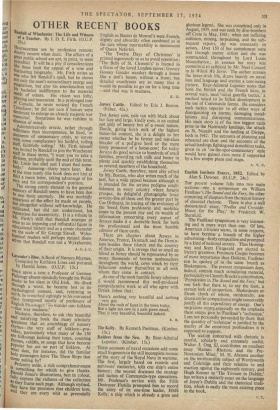English Institute Essays, 1952. Edited by Alan S. Downer. (O.U.P.
24s.) THE present volume falls into two main sections—one a symposium on William Faulkner's The Sound and the Fury, the other consisting of chapters from the recent history of classical rhetoric. There is also a well documented essay, 'Troilus and Cressida: Music for the Play,' by Frederick W. Stcrnfeld.
The Faulkner symposium is very interest- ing and in more ways than one. Of late, American criticism seems, in some respects, to have become a branch of the higher advertising—hotly competitive and prompted by a kind of national anxiety. Thus Heming- way and Scott Fitzgerald are elected to literary greatness, Fenimore Cooper becomes of more importance than Dickens, Faulkner can be spoken of in the same breath as Shakespeare. The present symposium does, indeed, contain much stimulating material, particularly in Clcanth Brooks's contribution, 'Primitivism in The Sound and the Fury,' but one feels that there is, to say the least, a certain lack of proportion. Shakespeare or Dante (both of whom, incidentally, are drawn on for comparisons) might conceivably justify all this expenditure of energy. One's suspicions centre especially on the emphasis these essays give to Faulkner's 'technique.' I am not personally persuaded by them that the quantity of 'technique' is justified by the quality of the emotional profundities it is supposed to support.
The section concerned with rhetoric is careful, scholarly and extremely useful. Walter J. Ong, SJ, contributes an excellent essay 'Rams: Rhetoric and the Pre- Newtonian Mind,' M. H. Abrams another on the inexhaustible subject of Wordsworth and Coleridge and their relation to and reaction against the eighteenth century, and Hugh Kenner in 'The Trivium in Dublin,' has written a masterly essay on the language of Joyce's Dublin and the rhetorical tradi- tion, which is easily the most exciting piece in the book.


































 Previous page
Previous page